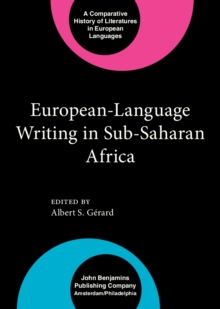
New Literary Hybrids in the Age of Multimedia Expression : Crossing borders, crossing genres PDF
Edited by Cornis-Pope Marcel Cornis-Pope
Part of the Comparative History of Literatures in European Languages series
Description
Begun in 2010 as part of the "Histories of Literatures in European Languages" series sponsored by the International Comparative Literature Association, the current project on New Literary Hybrids in the Age of Multimedia Expression recognizes the global shift toward the visual and the virtual in all areas of textuality: the printed, verbal text is increasingly joined with the visual, often electronic, text. This shift has opened up new domains of human achievement in art and culture. The international roster of 24 contributors to this volume pursue a broad range of issues under four sets of questions that allow a larger conversation to emerge, both inside the volume's sections and between them. The four sections cover, 1) Multimedia Productions in Theoretical and Historical Perspective; 2) Regional and Intercultural Projects; 3) Forms and Genres; and, 4) Readers and Rewriters in Multimedia Environments. The essays included in this volume are examples of the kinds of projects and inquiries that have become possible at the interface between literature and other media, new and old. They emphasize the extent to which hypertextual, multimedia, and virtual reality technologies have enhanced the sociality of reading and writing, enabling more people to interact than ever before. At the same time, however, they warn that, as long as these technologies are used to reinforce old habits of reading/ writing, they will deliver modest results. One of the major tasks pursued by the contributors to this volume is to integrate literature in the global informational environment where it can function as an imaginative partner, teaching its interpretive competencies to other components of the cultural landscape.
Information
-
Download - Immediately Available
- Format:PDF
- Pages:462 pages
- Publisher:John Benjamins Publishing Company
- Publication Date:27/11/2014
- Category:
- ISBN:9789027269331
Information
-
Download - Immediately Available
- Format:PDF
- Pages:462 pages
- Publisher:John Benjamins Publishing Company
- Publication Date:27/11/2014
- Category:
- ISBN:9789027269331










